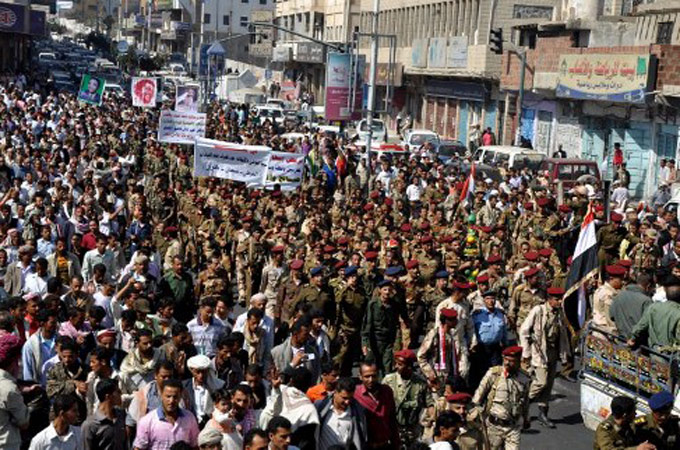Sectarian clashes erupt in strife-torn Yemen
Deadly violence between Shia rebels and Sunni fighters in north, as protests against president’s immunty deal continue.

 |
| Yemenis have protested for nearly a year, calling for the removal of President Ali Abdullah Saleh [AFP] |
Deadly clashes have broken out between Zaidi Shia rebels and Sunni Salafist gunmen in northern Yemen, a security official has said, as anti-government protests continued across the nation.
Heavy fighting erupted on Thursday morning in the northern Hajjah province between rebel gunmen, known as Houthis, and Sunni fighters, the local official told news agencies.
Both sides blamed each other for the bloodshed, which represents the latest flareup in one of the internal conflicts threatening a power transfer deal signed in November last year to pull back Yemen from the brink of civil war.
The security official said at least one gunbattle took place in the city of Mustaba, close to the Red Sea port city of Midi, at the border with Saudi Arabia.
Other clashes erupted between the Sunni Waela tribe and Shia rebels in the province of Saada, the stronghold of the rebels.
The AFP news agency reported 20 people dead from the fighting.
Surour al-Wadi’i, a spokesman for the Sunni Salafi group, told the Reuters news agency that at least four fighters were killed by Houthi fighters who attacked early on Thursday in an area near the city of Saada, north of the capital Sanaa.
A statement issued by the Shia group’s leader, Abdelmalek al-Houthi, accused the Salafis of waging “unjustified
aggression”, saying their attacks began on Wednesday when one person was killed.
Alleged inequality
Fighting between the Sunnis and the Houthi rebels has raged over the past months in the northern town of Dammaj, south of Saada, where a Salafist Islamic teaching school was besieged by Houthi rebels.
At least 71 people were killed in clashes that erupted in mid-October, a spokesman for the Dar al-Hadith school claimed in late December.
The school trains Sunni preachers and believes in a strict interpretations of Islam.
In 2004, Zaidi Shias, who regularly complain of inequality and marginalisation by the central government, rebelled against President Ali Abdullah Saleh’s government.
Thousands of Yemenis were killed before a ceasefire was declared in February 2010.
Immunity deal
Elsewhere in Yemen, thousands of of people demonstrated on Thursday in several cities, voicing their rejection of a Gulf Co-operation Council (GCC) deal to grant Saleh immunity from prosecution, witnesses said.
In the capital Sanaa, protesters marched from Change Square, the focal point of almost a year of anti-Saleh demonstrations, through Al-Siteen street, an AFP correspondent reported.
Other protests were held across the country, rejecting the immunity law for Saleh and his aides, drafted on Sunday by the transitional government that was formed after Saleh signed the Gulf plan easing him out of office by the end of February.
Protesters want those accused of killing demonstrators to be brought to justice.
The parliament is yet to convene to ratify the law.
February polls
Saleh signed the GCC deal in November which requires him to hand authority to Abdrabuh Mansur Hadi, Yemen vice-president, who would then work with the opposition to form a national unity government.
Saleh now serves as an honorary president until polls are held in February.
A bloody crackdown on anti-Saleh demonstrations that erupted in January 2011 has claimed hundreds of lives.
Rights groups have slammed the immunity law, while UN High Commissioner for Human Rights Navi Pillay said anyone who had committed abuses during the mass protests in Yemen must not be allowed to evade justice.
The US defended the draft amnesty law on Monday, saying that the Gulf-brokered deal contained a provision for an amnesty that had to be implemented by Hadi and the opposition.